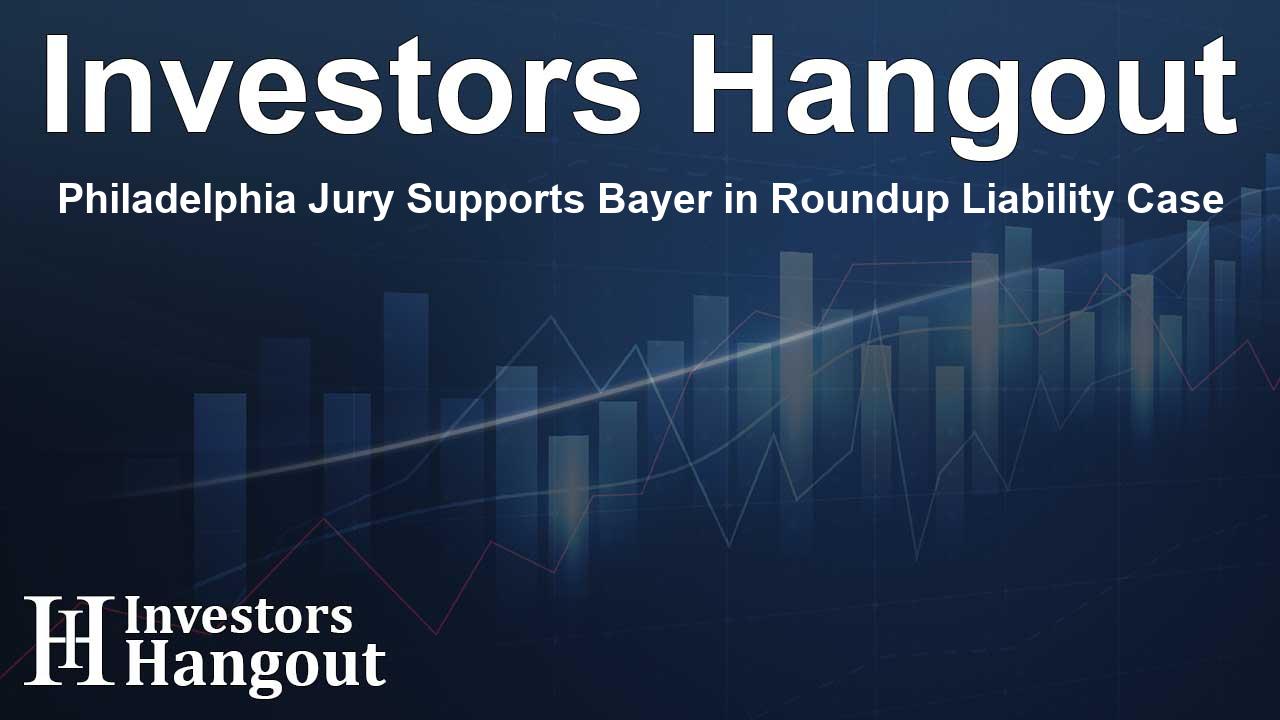Philadelphia Jury Supports Bayer in Roundup Liability Case

Bayer's Victory in the Roundup Liability Trial
Bayer's subsidiary, Monsanto, recently celebrated a significant legal win when a jury in Philadelphia ruled in its favor during the Young Roundup product liability trial. This verdict comes amidst ongoing scrutiny and debate regarding the safety of Roundup, a widely used herbicide that has faced numerous lawsuits claiming it causes cancer.
Background on Bayer and Monsanto
Bayer, a well-known name in the pharmaceutical and agricultural sectors, made headlines in 2018 when it acquired Monsanto for an impressive $63 billion. This merger merged Bayer's expertise in sustainable agriculture with Monsanto's extensive portfolio of crop protection products, including Roundup. Since then, Bayer has had to navigate a complex landscape of legal challenges, particularly surrounding Roundup’s alleged health risks.
The Impact of the Jury's Verdict
This jury decision is a pivotal moment for Bayer, reflecting a legal landscape in which companies face growing scrutiny over their products. The verdict not only signifies a win for Bayer in this specific instance but also reinforces the ongoing debate about Roundup and similar glyphosate-based herbicides. The potential implications for future litigations remain to be fully understood as the company continues to argue the safety of its products.
Challenges Ahead for Bayer
Despite this legal victory, Bayer is not out of the woods yet. The company still faces thousands of lawsuits that challenge the safety of Roundup. The narrative surrounding the product has attracted significant media attention and public opinion is mixed. As Bayer continues to handle these challenges, it must also focus on rebuilding its reputation and reassuring consumers about the safety and efficacy of its products.
Looking Forward
The ongoing legal battles imply that the conversation surrounding glyphosate and its health effects will persist. Bayer aims to navigate through these discussions, ensuring transparency and commitment to safety. As they advance, the lessons learned from these trials may inform how they engage with both consumers and regulatory bodies moving forward.
Conclusion
As Bayer continues its journey after acquiring Monsanto, the recent jury ruling in Philadelphia stands as a crucial milestone. It could potentially reshape the landscape of the ongoing litigation surrounding Roundup. Bayer's proactive commitment to resolving these issues is key to maintaining its market presence and strengthening consumer trust.
Frequently Asked Questions
What was the recent verdict in the Philadelphia trial?
A Philadelphia jury ruled in favor of Bayer's subsidiary, Monsanto, in a product liability trial related to Roundup.
How much did Bayer pay for the acquisition of Monsanto?
Bayer acquired Monsanto for $63 billion in 2018.
What is the primary concern related to Roundup?
The main concern is whether Roundup, which contains glyphosate, causes cancer, sparking numerous lawsuits against Bayer.
What challenges does Bayer still face after the verdict?
Bayer continues to face thousands of lawsuits regarding Roundup's alleged health risks.
What does this ruling mean for Bayer's future?
This ruling could influence the future landscape of litigation surrounding Roundup, as well as Bayer's strategies for addressing safety concerns.
About The Author
Contact Lucas Young privately here. Or send an email with ATTN: Lucas Young as the subject to contact@investorshangout.com.
About Investors Hangout
Investors Hangout is a leading online stock forum for financial discussion and learning, offering a wide range of free tools and resources. It draws in traders of all levels, who exchange market knowledge, investigate trading tactics, and keep an eye on industry developments in real time. Featuring financial articles, stock message boards, quotes, charts, company profiles, and live news updates. Through cooperative learning and a wealth of informational resources, it helps users from novices creating their first portfolios to experts honing their techniques. Join Investors Hangout today: https://investorshangout.com/
The content of this article is based on factual, publicly available information and does not represent legal, financial, or investment advice. Investors Hangout does not offer financial advice, and the author is not a licensed financial advisor. Consult a qualified advisor before making any financial or investment decisions based on this article. This article should not be considered advice to purchase, sell, or hold any securities or other investments. If any of the material provided here is inaccurate, please contact us for corrections.
